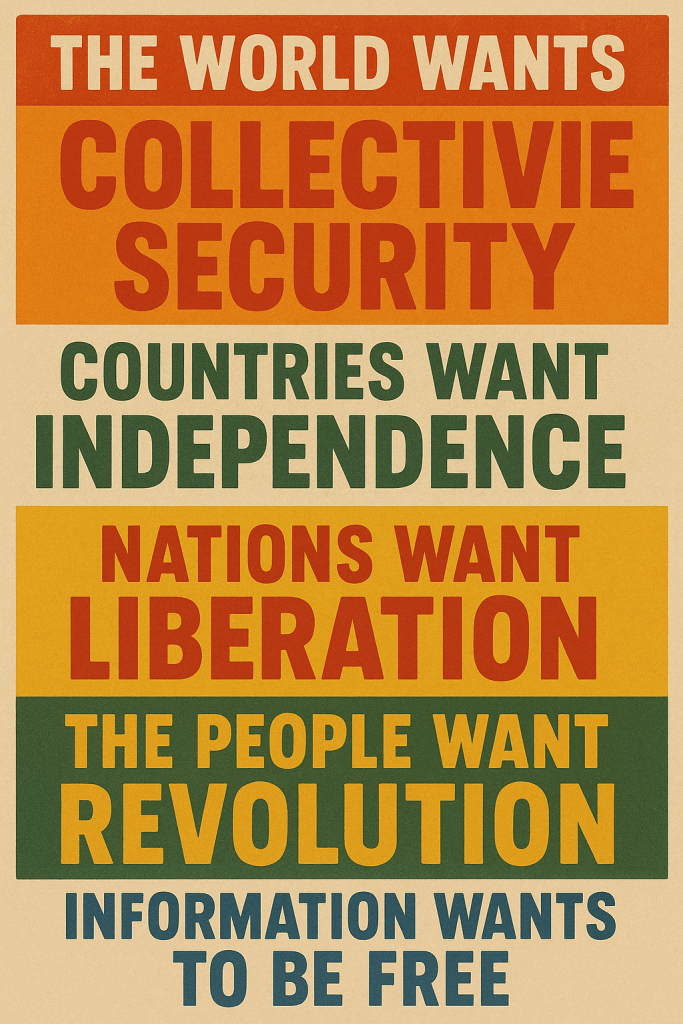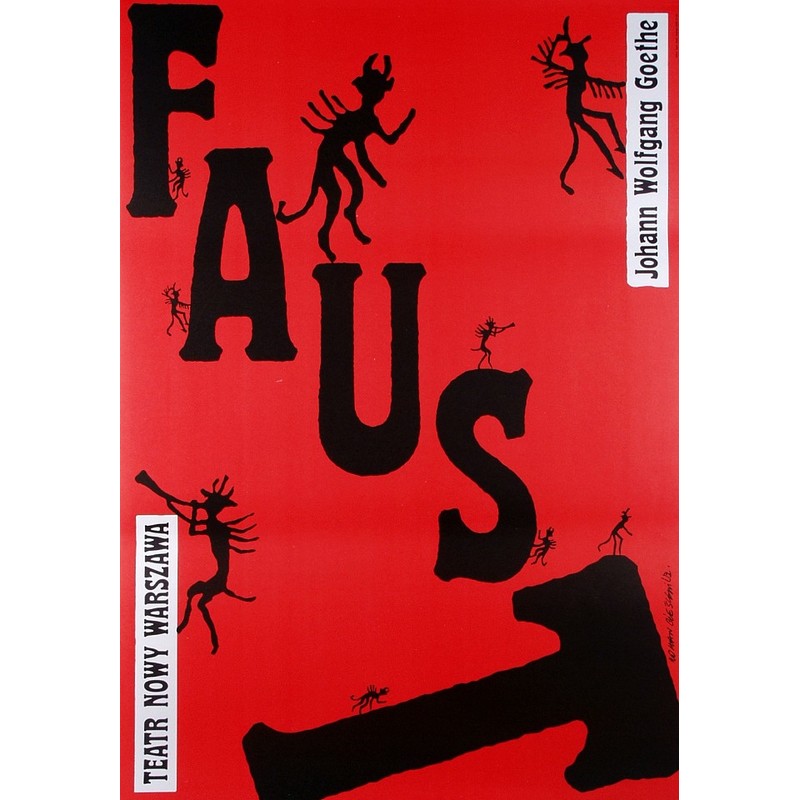Bill Kerr
Q&A format:
- What is the situation on the battlefield?
- What hard problems does Ukraine face?
- What are Ukraine’s main strategic objectives?
- What is Russia’s official position?
- What are the Russian political and economic problems and can they overcome them?
- What is the mood of the Russian people?
- Why is Trump behaving badly with respect to Ukraine?
- Are Europe and NATO doing enough?
- Where are the peace proposals headed?
- Predictions
- Final words
What is the situation on the battlefield?
The situation changes everyday. To keep up to date follow some of the links here to regular commentators such as Chuck Pfarrer or Ben Hodges. But the general situation and trends are fairly clear as we approach the 4th year of the Russian invasion on February 24, 2022.
Russia made some early significant gains but were then beaten back. They underestimated Ukraine massively and their apparent superiority on paper was revealed to be technologically and militarily corrupt, incompetent and inefficient. Most people thought Russia would win quickly but it was not to be. Ukraine has a strong tradition of technological innovation and military production. Previously, they were an important supplier of Russian components and armaments.
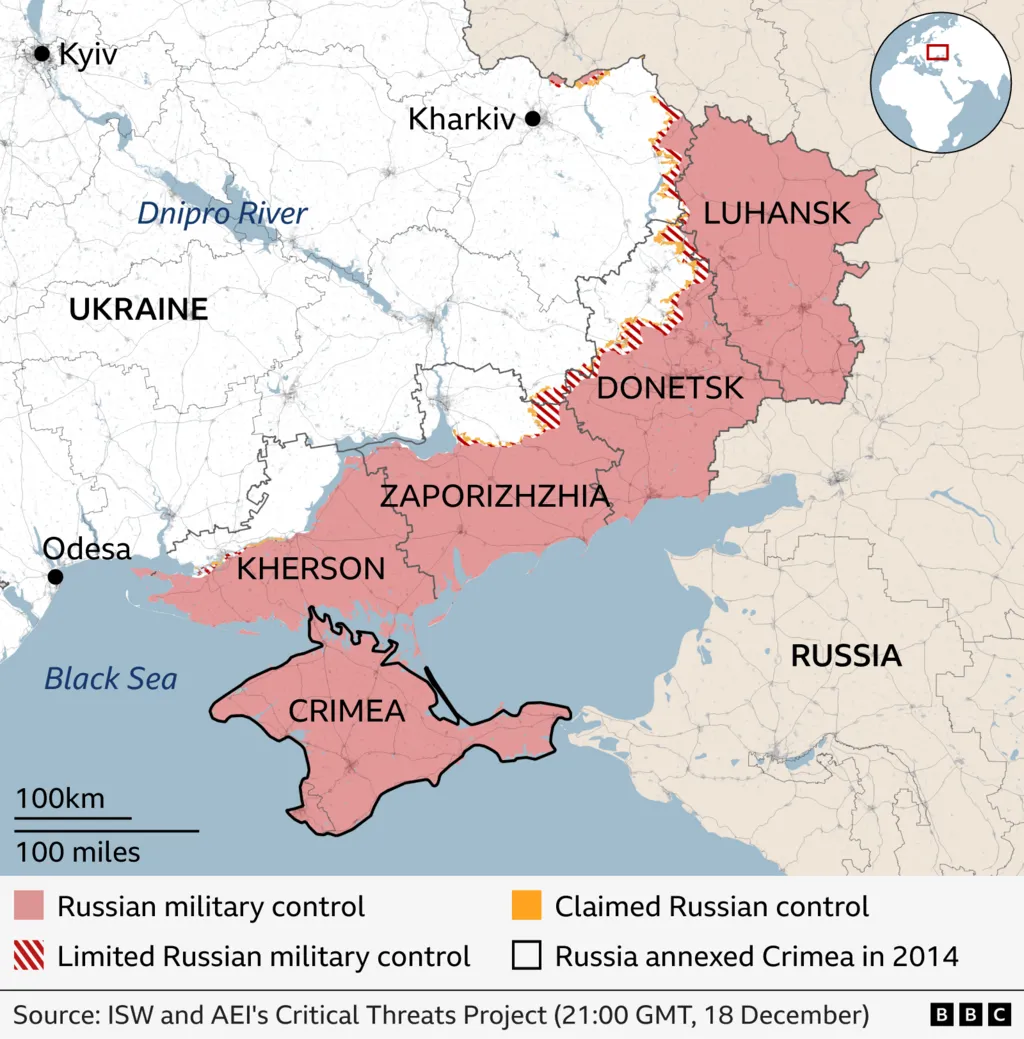
Listen to the real experts, with military background who study the situation daily (Pfarrer, Hodges, Petraeus). When it comes to Ukraine you can’t trust the John Mearsheimer types sample here, who are not actually paying attention, misread the situation and only look for information which correlates with their pre existing world view (that Big Powers determine history). By the way, that world view was disproved by the outcome of the Vietnam war.
Russia has a gangster leader, Putin, which spawns a gangster army with all the limitations that follow from that.
This is explained in detail by Chuck Pfarrer, a former Navy SEAL, sample link here. Russia cannot win due to incompetence, actually military malpractice, of their commanders, from Putin down. They don’t care how many Russians are killed. Putin only wants to hear that a new city has been captured. No one dares to tell the truth to Putin. There is lack of respect for the enemy. Competent Russian leaders are dismissed for standing up for their troops (“constant frontal attacks are not working”, the same mistakes repeated continually). Some Russian troops have become non compliant. African mercenaries and ex prisoners are “disposable”, sent off on meat assaults.
Pfarrer’s analysis is confirmed by Ben Hodges, a former commanding general, United States Army Europe.
David Petraeus, former US lead general in both Iraq and Afghanistan, recently said that the biggest misconception of the war is that Russian success is inevitable. He has high praise for Ukraine’s “incredible achievements” in drone warfare, sinking 35% of Russia’s Black Sea fleet and other initiatives. Ukraine has been very innovative and changed the nature of modern warfare by its extensive use of unmanned systems.
Nevertheless, it is overall a war of attrition with neither side able to obtain a decisive upper hand, yet.
Putin thinks Russia can out suffer their enemies but given the extent of their casualties and the resolve of the Ukrainians, then, provided sufficient support keeps flowing from the Coalition of the Willing, this may turn out to be an illusion.
Russian casualties are enormous. On average, there are 1000 Russian casualties per day. Russia achieves minimal territorial advances at enormous cost, eg. Pokrovsk (250,000 casualties). Ragnar Gudmundsson estimates 227 Russian casualties for each sq km gained. Click on “Area gains” on the sidebar. Ragner’s site provides a very comprehensive statistical overview of the state of the war.
Ukraine casualties figure are not revealed by Ukraine. One estimate from Ragnar Gudmundsson’s site citing The Economist in November 2024 was that Ukraine military deaths ranged from 60-100,000. Russian estimated casualty figure at the date was 740,400 so given that 26% of those were deaths, the Russian death figure is roughly 192,000. So, if these figures are accurate the Russian:Ukraine death ratio is somewhere between 3:1 to 2:1.
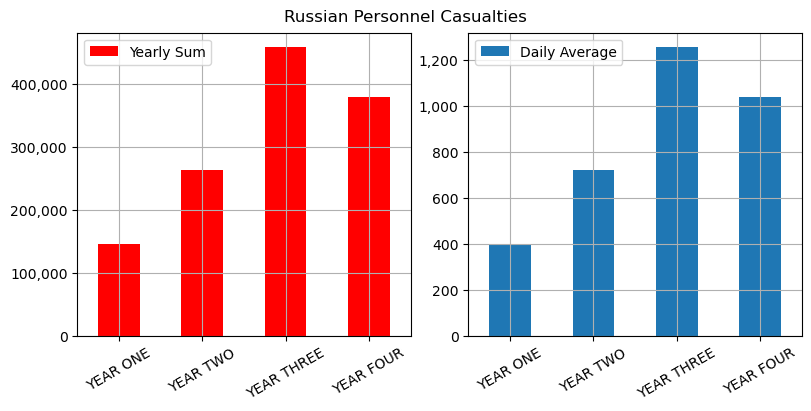
What hard problems does Ukraine face?
- Russia is bigger
- Russia has a bigger population than Ukraine: 3.5 times (142 million versus 39 million)
- Russia’s economy is 11 times larger than Ukraines: 2.17 trillion versus 191 billion
- they were reputed to have the world’s 2nd strongest military (a claim which looks ridiculous now) with the 3rd largest military budget
- military spending is 3 times larger than Ukraines: 145 billion (6.3% GDP) v 54 billion (28% GDP)
- some European countries were dependent on Russian and oil imports (Germany, Netherlands, Turkey, Poland, Finland …)
| COUNTRY | POPULATION | ECONOMY | MILITARY SPENDING | |
|---|---|---|---|---|
| Russia | 142 million | 2,195 billion | 1456 billion | |
| Ukraine | 39 million | 1,456 billion | 541 billion |
Ukraine can only match this with reliable financial, military and humanitarian support from the Coalition of the Willing. Financial aid has been undermined by Trump since his election but according to Petraeus (see below) Europe has stepped up sufficiently to maintain Ukraine for at least another two years.
- Ukraine’s AWOL problem
It is confirmed at the highest level that Ukraine has huge AWOL problems:
“Ukraine estimates that 200,000 of its soldiers are absent without official leave (AWOL), meaning they have left their positions without permission to do so, the country’s new Defense Minister Mykhailo Fedorov revealed on Wednesday.
Speaking in the Ukrainian Parliament ahead of the vote that confirmed him as the new defense chief, Fedorov also said some 2 million Ukrainians are “wanted” for avoiding military service. ”
Ukraine’s manpower crisis emerges as a strategic vulnerability
Clearly, this is serious, but does not appear decisive given the stepped up use by Ukraine of unmanned systems. Their troops are better trained, better equipped and far better led than the Russians.
- Russian attacks on civilians
The sheer volume of Russian attacks on civilian targets (hospitals, schools) and infrastructure is a problem. Electricity infrastructure is under attack continuously. Winter temperatures are well below zero. Read this account on winter life in Kyiv by the editor of the Kyiv Independent.
Ukraine does need more help from its allies in the domain of air and ballistic defence capabilities.
- Zelensky has political troubles
Recently one of Zelensky’s top aides was removed on alleged financial corruption issues.
This source (read this link!)shows that Ukrainians believe that government corruption is a huge long term problem in their country (85%) but that confidence in their military is very strong (90%) and that support for Zelensky remains high (67%) although it has decreased from the Feb 2022 start of the war (85%)
What are Ukraine’s main strategic objectives?
As noted above Ukraine is winning on the battlefield, conceding some territory in exchange for massive Russian casualties.
Ukraine has demonstrated superior technological mastery, particularly with drones. Zelensky says that 80% of Russian targets are destroyed by drones.
Importantly, Ukraine attacks Russian infrastructure, especially oil & gas & occasionally a fleet of bombers or a General in Moscow. One of their main aims is to destroy the money making and war fuelling Russian oil and gas infrastructure. They have had some tremendous success in this and Russia has had to adapt by importing gasoline from Belarus.
Ukraine successfully invaded Russian territory near Kursk (and held it for months) and Belgorad. This diverted Russian troops from the front line. In response Russia used troops from North Korea.
In 2025 there was a massive increase in drone usage by both sides. See graph below. Sometimes the Russians have been innovative, eg with fibre optic drones, but overall Ukraine is ahead. Drones are the new artillery and add tremendous potency to the infantry.
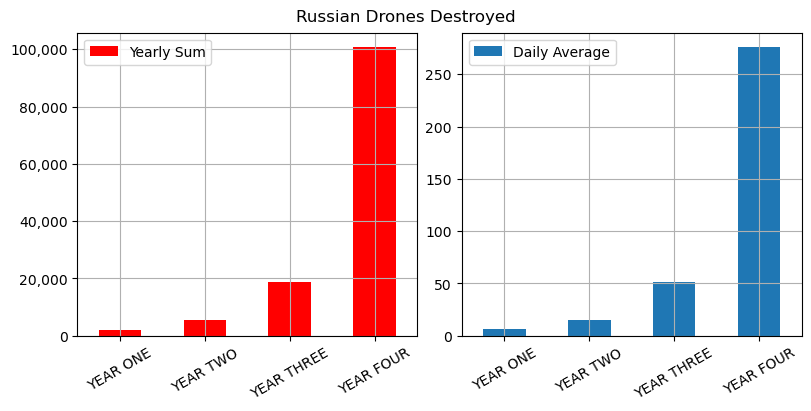
Neither side appears to have airforce superiority. According to this article, neither side dominates due to effective air defense systems, including drones. The air defence system on both sides is sufficient to keep fighters and bombers at a distance. On the front line drones have largely replaced them.
Russia employs glide bombs on city / civilian attacks to devastating effect. Ukraine has F16s from various countries.
According to one expert Russian’s can’t deploy their weapons, the battle zone is too wide, resulting in an extensive grey zone. Ukraine has better weapons all around, eg. the Archer from Sweden and the Caeser from France.
Ukraine’s innovative military doctrine continues to evolve rapidly. The trend is that Ukraine becomes stronger and Russia becomes weaker.
These trends are confirmed by a recent statement from Ukraine’s General Syrskyi:
The active front line stretches about 1200 km; the kill zone extends 15-20 km in depth.
Enemy strength is around 712,000 personnel, but casualty levels exceed Russia’s ability to replenish forces…
Work continues to increase the effectiveness of drones in air defense. Plans include redistributing functions between surface-to-air missile forces and a new branch of forces responsible for protecting critical infrastructure
Drones account for roughly 60% of all firepower on the front; artillery accounts for about 40%. In infantry firefights, Ukrainian soldiers prevail over the enemy in about 90% of engagements …”
What is Russia’s official position?
Russia has been consistent and unchanging in their demands. The following points were made by Russian Security Council Chairperson Dmitry Medvedev on February 1, 2026 ([link[(https://www.criticalthreats.org/analysis/russian-offensive-campaign-assessment-february-2-2026)):
- Ukraine must cede Luhansk, Donetsk, Zaporizhia, and Kherson oblasts (see the map at the start)
- Ukraine has to demilitarize
- the Ukraine government are Nazis and so that government has to be replaced with a pro-Russian government
- compared the current conflict with Ukraine to the second world war with Russia defending the state and the Russian people
- those in Russia who are indifferent to Russian soldiers on the front, who are unwilling to help their own state, and who “lack basic patriotism” are Russia’s “internal enemies.”
- rejected proposals from the British and French-led Coalition of the Willing to station foreign troops on Ukrainian territory as part of postwar security guarantees for Ukraine.
- the risk of a global nuclear exchange is high, Russia will use nukes if the fate of Russia is at stake
- Finland has dismantled Russian-Finnish relations
What are the Russian political and economic problems and can they overcome them?
As noted above Putin doesn’t want to hear the truth which puts him at a disadvantage. Periodically, those who question Putin fall out of windows or suffer a plane crash or a gaol sentence.
Putin faces internal dissent. For example, General Igor Girkin created the “Club of Angry Patriots” to save Russia from what he said was the danger of systemic turmoil due to military failures in Ukraine and jostling in the elite to eventually succeed Putin. He was then sentenced to 4 years in gaol. (source)
Russia has militarised their economy (more than 6% military spending of GDP in Feb 2025 and rising) and the Russian people are suffering. How big are their economic troubles and can Putin manage it?
Russia influence is collapsing on many fronts internationally (Venezuela, Syria, Transnistria, Black Sea, with trouble brewing in Iran and Chechnya). Nevertheless, Russia maintains some currently supportive allies: North Korea, Georgia, Cuba, China, Belarus.
Russian nukes are paper tigers. He periodically threatens to use them but can never find a way that might help him achieve his goals. This still seems to frighten some European leaders.
What is the mood of the Russian people?
Some insights from Elvira Barry:
With Putin as leader Russia is in decline. Their population is shrinking and their technology is outdated, the education system and health care are all in trouble. Many who are well educated have left the country. Elvira Barry divides up the opinions of the people in this way. The dreams of:
- the imperialists argue that the west wants to destroy Russia. They want a powerful, militarised Russia
- the survivors long for a return to the pre-war days. They are apolitical but if pressed: “Ask them who they support and they will confidently say ‘Putin made the country strong”
- the reformers want a properly functioning democracy. They face enormous obstacles here with the current regime of censorship
She moves on to talk about the opinions of the leaders of other countries. This varies from deep distrust to pragmatic support. The consensus here is that Russia is a declining but dangerous power.
Why is Trump behaving badly with respect to Ukraine?
Like everyone else I’m unsure of the answer to this question.
Trump’s stated surface position is that war is bad for business and he is good at stopping wars around the world
The previous Biden administration supplied billions of dollars of arms to Ukraine but with significant restrictions. The weapons could only be used within Ukraine territory. Their dithering policy was avoid a dangerous escalation. A background worry is that a dangerous escalation or a Ukraine victory might lead to tactical nukes being used.
This fear of where the nukes will end up seems to be a strong motivator in both the Biden and Trump administrations. Neither want Putin to fall.
Early in the piece Trump and Vance had a confrontation with Zelensky and said “Zelensky has no cards”. Perhaps Trump listens to bad advice about the real situation in the war or perhaps that was blather.
Trump has been critical of Europe for not pulling their weight in NATO and for their trading policies. These criticisms are legitimate.
Trump policy can be partly explained in terms of his preoccupation with money. He moved onto attempting to do a rare earths deal with Ukraine and is ok with Ukraine buying American weapons through Europe.
One interpretation is that Trump accepts Ukraine as part of Russia’s legitimate sphere of influence. His focus will be on keeping America strong in the Western hemisphere and stepping back from a global role it pursued previously. But Trump is hard to fathom. His recent move against Venezuela and possible future move against Iran creates huge problems for Putin.
Are Europe and NATO doing enough?
Zelensky, at Davos, angrily criticised Europe for their slowness.
Following on from Russia’s militarisation and America’s strategic withdrawal Europe is stepping up but this is uneven and slow.
Finland joined NATO in 2023 and Sweden in 2024.
According to Ben Hodges Germany, Finland and Romania (and perhaps others) have grasped the need to increase their military preparation.
David Petraeus presents a positive picture. He says the recent decision by the EU to provide 105 billion dollars equivalent (zero interest loan which doesn’t have to be repaid prior to Russian reparations) to Ukraine will solve their problems for the next couple of years and double their production of drones and the Flamingo cruise missile (which have a longer range – 3000 km – than the US tomahawk cruise missile, very significant capabilities).
As Ukraine has become smarter with their technological innovation and production, so has Europe.
Strong NATO voices are emerging. Canadian PM Mark Carney speech as Davos 2026 called for the middle powers to step up now that the US as a big power could no longer be trusted.
Sometimes it seems that frozen Russian assets are finally heading for Ukraine (through the efforts of EU Ursula von der Leyen) but this is an on again / off again story.
Europe’s combined financial contribution to Ukraine is roughly equivalent to what was supplied previously by the US.
Europe could do much more. For example the Russian oil carrying shadow fleet is vulnerable to NATO forces in the Baltic but Europe allows them to continue. But that would be up high on the escalation ladder.
Where are the peace proposals headed?
Trump has initiated peace proposals. Zelensky cooperates and inputs into this process but Putin doesn’t.
Ukraine has presented its own 20-point peace plan to the US, to counter the initial American plan which was heavily favouring Russia.
Finland PM Stubb recently said there was “full agreement between Ukraine, US and Europe” but I’m not sure what he meant by this. Britain and France are prepared to put in front line trip wire troops if a peace agreement is reached (rejected by Russia, see above).
There is little evidence that the war will end soon through these pathways. Although both sides have big problems in continuing, it is unlikely that either will abandon their declared aims.
Predictions
- The Russian Ukraine war will continue throughout 2026. The only real hope of that not happening is an internal Russian coup against Putin.
- Ukraine will continue to strengthen, Russia will continue to weaken.
- Europe will strengthen their spine.
- If Trump takes out Iran then that is a huge rewrite of the geo-political map. One outcome is that Iran will switch from a Russian ally to a Ukraine ally.
Final words
“Wherever there is oppression, there is resistance. Countries want independence, nations want liberation and the people want revolution—this has become the irresistible trend of history. All nations, big or small, should be equal; big nations should not bully the small and strong nations should not bully the weak.” source

